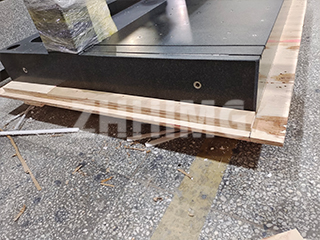In precision metrology, the coordinate measuring machine (CMM) is essential for quality control and high-accuracy measurements. One of the most critical components of a CMM is its workbench, which must maintain stability, flatness, and precision under varying conditions.
Material of CMM Workbenches: High-Quality Granite Surface Plates
CMM workbenches are typically made from natural granite, specifically the renowned Jinan Black Granite. This material is carefully selected and refined through mechanical machining and manual lapping to achieve ultra-high flatness and dimensional stability.
Key Advantages of Granite Surface Plates for CMMs:
✅ Excellent Stability: Formed over millions of years, granite has undergone natural aging, eliminating internal stress and ensuring long-term dimensional accuracy.
✅ High Hardness & Strength: Ideal for supporting heavy loads and operating under standard workshop temperatures.
✅ Non-Magnetic & Corrosion Resistant: Unlike metal, granite is naturally resistant to rust, acids, and alkalis.
✅ No Deformation: It does not warp, bend, or degrade over time, making it a reliable base for high-precision CMM operations.
✅ Smooth, Uniform Texture: Fine-grained structure ensures accurate surface finish and supports repeatable measurements.
This makes granite an ideal material for the CMM base, far superior to metal in many aspects where long-term precision is critical.
Conclusion
If you’re looking for a stable, high-precision workbench for a coordinate measuring machine, granite is the optimal choice. Its superior mechanical and chemical properties ensure the accuracy, longevity, and reliability of your CMM system.
While marble may be suitable for decorative or indoor applications, granite remains unmatched for industrial-grade metrology and structural integrity.
Post time: Aug-04-2025

